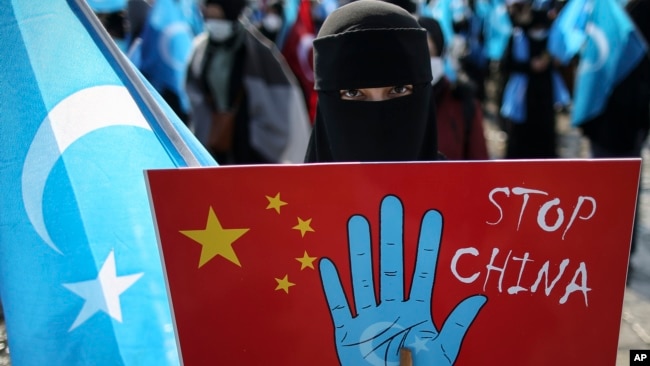2022 北京オリンピックを考える!
2021に延期された東京オリンピック。2022年は冬季北京オリンピックねんですよね!!
人権侵害と五輪平和憲章とは、相受け入れられないのではないでしょうか。
平和の祭典は空想の世界となってしまいます。
さあ、皆さんはどう考えますか?
英語を学び、世界を考える!!
今日のVOAニュース、Here we go!!
米国は北京オリンピックのボイコットを検討するのか?
Will US Consider Boycott of Beijing Olympics?
米国務省は、中国の人権問題と2022年の北京冬季オリンピックへの対応について、同盟国と話し合っていると発表しました。
国務省のネッド・プライス報道官は、火曜日に記者団に対し、米国はオリンピックを共同でボイコットするかどうかを同盟国と協議すると述べました。しかし、その後、国務省関係者がAP通信に語ったところによると、ボイコットの可能性はまだ検討されていないとのことです。
人権団体は、中国が2022年2月4日に開幕する大会を開催することに抗議しており、中国がウイグル人やチベット、香港の人々に対して人権侵害を行っていると非難しています。
活動家たちは、各国のオリンピック委員会や選手、大会を支援する企業に支援を求めています。国際オリンピック委員会(IOC)は、オリンピックを中国から移転させようという要求を拒否しています。
ここでは、ボイコットの可能性をめぐる主な論点をご紹介します。
IOCと中国の立場
トーマス・バッハ会長は、IOCは国連のオブザーバー資格を有しているものの、”中立”を保ち、政治に関与してはならないと述べています。バッハ会長は、先月の記者会見において:”我々IOCは国連や他の国際機関が解決できなかった問題を解決できたり、あるいは対処できるような超世界的な政府ではありません。」
中国政府は2日、ワシントンにボイコットしないよう警告し、ボイコットした場合には”強固な”中国の反応があると警告しました。
外務省のZhao Lijian報道官は、「スポーツの政治化は、オリンピック憲章の精神とすべての国の選手の利益を損なう」と述べました。また、国際的にも米国のオリンピック関係者は、ボイコットを”受け入れない”と付け加えました。
活動家がIOCと会談
活動家たちは昨年末、IOCと会談し、2022年のオリンピック開催地を移すよう要求しました。また、IOCが持っているという、中国が人権状況を”保証”した文書の閲覧も求めました。活動家によると、IOCはその文書を作成していないといいます。
この会議は、北京の準備を監督するIOC委員のフアン・アントニオ・サマランチ・ジュニア氏が主宰しました。
グロリア・モンゴメリー氏は、インターナショナル・チベット・ネットワークの活動家です。彼女は最近、IOCが会議に同意したのは、「私たちの言うことに耳を傾けて行動しようとしたというよりも、私たちと会議をしていると言うためだったのではないか」と感じたと語っています。
外交的ボイコット
活動家たちは、外交的ボイコットを検討してきましたが、1980年のモスクワオリンピックでアメリカが主導したようなものを排除していません。あのモスクワオリンピックでは、中国を含む65カ国がボイコットし、80カ国が参加しました。
ズムレタイ・アーキン氏は、世界ウイグル会議のスポークスウーマンです。彼女はAP通信に対し、外交的なボイコットは各地域で歓迎されるだろうと語っています。「私たちは説明責任を求めていますが、これは間違いなく説明責任を果たすための道筋の一部です」と彼女は言います。
ボイコットで何ができるのか?
1976年の大会でフェンシングの金メダルを獲得したバッハIOC会長は、1980年に西ドイツチームの一員としてモスクワから帰国しています。バッハ会長は、ボイコットは選手だけでなく、IOCの財政やイメージにも悪影響を与えるとし、反対しています。
IOCはその収入の91%を放映権やスポンサーシップの販売で得ているが、東京オリンピックの延期でその収入は減少しています。
活動家の中には、ボイコットを数少ない手段の一つと考えている人もいます。「ボイコットを呼びかける前に、IOCが中国から(オリンピック開催を)剥奪することを期待していたが、彼らはそれを望んでいなかった」とTeng Biao氏は言います。彼は亡命中の中国の人権弁護士であり、活動家でもある。「オリンピックは、北京政府がとても大切にしていることだと思います。そのチャンスをわれ我は放棄すべきではありません。」
Will US Consider Boycott of Beijing Olympics?
The U.S. State Department says it is talking with allies about China’s human rights record and how to deal with the 2022 Winter Olympics in Beijing.
State Department spokesperson Ned Price told reporters Tuesday the U.S. would discuss with allies whether to jointly boycott the games. But a state department official later told The Associated Press that the possibility of a boycott had not yet been discussed.
Human rights groups are protesting China holding the games, which are set to open on February 4, 2022. They accuse China of carrying out human rights abuses against Uyghur Muslims, as well as people in Tibet and Hong Kong.
Activists have sought support for their cause from national Olympic committees, athletes and companies supporting the games. The International Olympic Committee (IOC) has rejected calls to move the Olympics out of China.
Here is a look at some of the main issues surrounding a possible boycott:
Position of IOC and China
President Thomas Bach has said the IOC must remain “neutral” and out of politics, although the organization holds observer status at the United Nations. Bach told a news conference last month: “We are not a super-world government where the IOC could solve or even address issues” that the U.N. and other international organizations have not been able to solve.
China’s government warned Washington on Wednesday not to boycott, warning of a “robust” Chinese reaction if it did.
“The politicization of sports will damage the spirit of the Olympic Charter and the interests of athletes from all countries,” Foreign Ministry spokesperson Zhao Lijian said. He added that international and U.S. Olympic officials “will not accept” a boycott.
Activists have met with IOC
Activists met late last year with the IOC and requested that the 2022 Olympics be moved. They also asked to see documents the IOC says it has in which China gave “assurances” about human rights conditions. Activists say the IOC has not produced the documents.
The meeting was headed by IOC member Juan Antonio Samaranch Jr., who oversees preparations for Beijing.
Gloria Montgomery is an activist with the International Tibet Network. She said recently she felt like the IOC agreed to the meeting “so that they could say they were having a meeting with us, rather than because they actually wanted to listen and act on anything that we had to say.”
Diplomatic boycott
Activists have considered a diplomatic boycott, but have not ruled out the kind led by the U.S. in the 1980 Moscow Olympics. During those games, 65 countries -- including China -- stayed away, while 80 attended.
Zumretay Arkin is a spokeswoman for the World Uyghur Congress. She told The Associated Press she thinks a diplomatic boycott would be welcomed by her communities. “We have been looking towards accountability, and that is definitely part of that path toward accountability,” she said.
What would a boycott do?
IOC President Bach, who won a gold medal in fencing in the 1976 Games, was kept home from Moscow in 1980 as a member of the West German team. He opposes a boycott, which he says would hurt the athletes, as well as the IOC's finances and image.
The IOC earns 91 percent of its money from selling broadcast rights and sponsorships and has seen its income weakened by the postponed Tokyo Olympics.
Some activists say they see a boycott as one of the few forms of leverage they have. “Before we called for a boycott, we hoped that the IOC could strip China of (holding) the Olympics, but they didn’t want to do that,” said Teng Biao. He is an exiled Chinese human-rights lawyer and activist. “I think the Olympics is a thing the Beijing government cares very much about. We should not give up that chance.”
Words in This Story
athlete – n. a person who is trained in or is good at sports, games, or exercises that require physical skill and strength
address – v. to speak to someone of give a speech to an audience
robust – adj. strong and healthy
assurance – n. a promise
accountability – n. the fact or condition of being accountable; responsibility
sponsor – n. a person or organization that gives money to support an activity, event, etc.
leverage – n. the power to influence people in order to get what you want
strip – v. to remove or take away
